Notes from Joe, April 2019
Three Reasons to Support the HTC Network
By Joe Pugliese
Last month, I talked about the importance of HTCs and chapters working together as natural partners in taking care of patients and their families in the bleeding disorders community. Most people know that HTCs were created by an act of Congress in 1975 at the request of the hemophilia community. The support for HTCs was confirmed again in 1992 when HTCs were recognized as original covered entities eligible to participate in the 340B Program.
There are three key reasons that the whole community should champion the US HTC network.
The first of course is superior clinical outcomes for patients. Famously in 1998, Mike Soucie with the CDC confirmed that there was a 30 – 40% reduction in mortality and morbidity in hemophilia patients being seen at federally funded HTCs. We often quote that study and folks say, “it is an old study, how do we know it is still valid?” I am pleased to say we now have son of Soucie, more specifically “Population‐based surveillance of haemophilia and patient outcomes in Indiana using multiple data sources,” which was recently published in Haemophilia. Highlights from the study are noted below:
- Of the patients receiving care at an HTC, only 17.6% utilized ED services compared to a third of the non‐HTC patients (33.3%).
- Prophylaxis utilization among patients with severe haemophilia seen at an HTC was 30% higher compared to severe patients seen outside of the HTC network.
- Most, 89.2% (n = 628) of the study population had insurance during the study period.
- The primary insurance for 39.3% (247) of our population was private insurance
- 27.2% (171) had Medicaid
- 13.1% (82) had Medicare
- 2.2% (14) had either CHAMPUS or ICHIA state‐sponsored insurance, and
- 18.2% (114) had an unknown insurance type.
- The majority of cases without insurance, 57%, were Amish, and 94.7% of all haemophilia patients without insurance were cared for at an HTC.
- Nearly, 82% of patients with haemophilia visited an HTC; that is, approximately a 15-percentage point difference compared to the national estimate reported 20 years ago.
- HTC patients with severe hemophilia were 30% more likely to be treated with prophylaxis than patients outside of the HTC network
- There was a 47.1% lower frequency of ED use among patients being cared for at an HTC compared to patients cared for outside of the HTC network
Twenty-one years later it is clear that patients seen at HTCs have better outcomes, and better outcomes lead to lower costs. Better outcomes also lead to better patient satisfaction, as found in the recent patient satisfaction survey in the bleeding disorders community. The beauty of comprehensive care network is the program income generated from dispensing bleeding disorders therapies is invested into maintaining and expanding the ability of the HTCs to continue to produce these superior outcomes. A clear second reason to overtly support the comprehensive care model.
Finally, the HTC comprehensive care model saves money in three ways: better outcomes, lower unit cost, and lower utilization, a classic win-win-win. Recently, the California Medicaid program has proposed to implement a new reimbursement strategy that recognizes the quality and cost-saving benefits of contracting with the HTC network. I have been asked by many people what I think of this idea, my answer is always the same: it is about time! The benefits are obvious. The proposal is subject to review and approval by the federal government. I hope they look at the overwhelming evidence and approve the state plan amendment.
Also in this Issue…
Legal Update
· Roadmap for Compliant Expenditures of Federal Funds: Highway to the Danger Zone!
Payer Update
· Payer Update – It’s All About the Data!
Alliance Update
· Spring Into our Services
Notes from the Community
· HFA Announced Archive Project with Smithsonian Institution
· Seeking Director of Community Relations
Team Alliance Contact Information
We work for you! Please don’t hesitate to contact any of us with any questions or concerns:
| Name | Phone | |
|---|---|---|
| Jeff Blake | jeff@hemoalliance.org | 317-657-5913 |
| Sean Singh | sean@hemoalliance.org | 813-748-7226 |
| Jennifer Borrillo, MSW, LCSW, MBA | borrillo@hemoalliance.org | 504-376-5282 |
| Jeff Amond | amond@hemoalliance.org | 608-206-3132 |
| Jennifer Anders | jennifer@hemoalliance.org | 954-218-8509 |
| Angela Blue, MBA | angela@hemoalliance.org | 651-308-3902 |
| Karen Bowe-Hause | karen@hemoalliance.org | 717-571-0266 |
| Zack Duffy | zack@hemoalliance.org | 503-804-2581 |
| Michael B. Glomb | MGlomb@ftlf.com | 202-466-8960 |
| Johanna Gray, MPA | jgray@artemispolicygroup.com | 703-304-8111 |
| Kiet Huynh | kiet@hemoalliance.org | 917-362-1382 |
| Elizabeth Karan | elizabeth@karanlegalgroup.com | 612-202-3240 |
| Kollet Koulianos, MBA | kollet@hemoalliance.org | 309-397-8431 |
| Roland P. Lamy, Jr. | roland@hemoalliance.org | 603-491-0853 |
| Dr. George L. Oestreich, Pharm.D., MPA | george@gloetal.com | 573-230-7075 |
| Theresa Parker | theresa@hemoalliance.org | 727-688-2568 |
| Mark Plencner | mark@hemoalliance.org | 701-318-2910 |
| Ellen Riker | eriker@artemispolicygroup.com | 202-257-6670 |

Comments are closed.